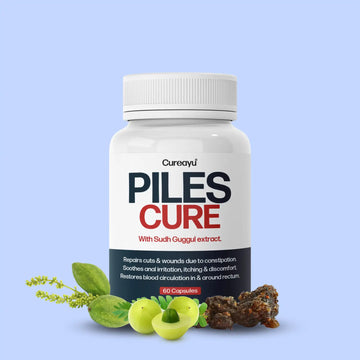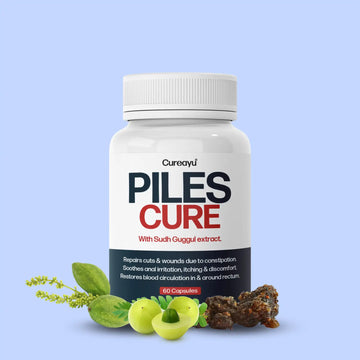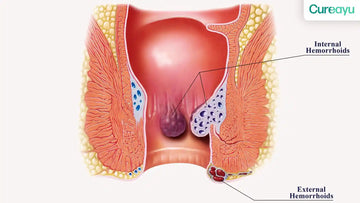Have you ever experienced a sharp shooting sensation in your back that travels down to your legs, accompanied by a feeling of fullness in the rectum? These symptoms might leave you puzzled until you start researching and discover you could be dealing with piles.
Piles, often overlooked, is a common medical condition that many encounter at some point in life. While it is treatable, ignoring its symptoms can lead to unnecessary discomfort. This comprehensive guide will help you recognize the signs, understand the causes, and find actionable remedies to ease piles pain and prevent recurrence.
What Are Piles & Common Causes
Piles, also known as hemorrhoids, are swollen veins in the anal area and rectum. They can be classified as internal, forming inside the rectum, or external, forming just outside the anus. Both types can cause discomfort, itching, and pain, and in some cases, they may result in bleeding.
The common causes of piles include:
-
Straining during bowel movements: This increases pressure on the veins, causing them to swell.
-
Prolonged sitting: Spending too much time seated, especially on the toilet, can exacerbate the problem.
-
Obesity: Excess weight can increase pressure on the rectal veins.
-
Chronic diarrhea or constipation: Both conditions can contribute to piles by straining or irritating the veins.
-
Pregnancy: Hormonal changes and the weight of the baby can lead to swollen veins.
-
Genetics: Family history can play a significant role in the likelihood of developing piles.
Addressing the underlying cause is often the first step in finding an effective piles remedy.
Also Read: Thyroid Disease Demystified: Symptoms, Types, and Management
Recognizing Symptoms and When to See a Doctor
Piles symptoms can range from mild discomfort to severe pain. Common signs include:
-
Bleeding during bowel movements: This may appear as bright red blood on the toilet paper or in the toilet bowl.
-
A feeling of incomplete evacuation: Even after passing stool, you might feel like there is more to come.
-
Itching or irritation around the anus: This can cause significant discomfort and impact daily activities.
-
Pain or swelling near the anus: External piles can sometimes form painful lumps.
-
Lumps near the anus: These may be tender to the touch and vary in size.
If these symptoms persist for more than a few days or worsen, it is crucial to consult a doctor. Delaying medical advice may lead to complications, making treatment more challenging.
Effective Remedies to Ease Piles Pain
1. Increase Fiber Intake
Eating a fiber-rich diet helps soften stools and reduces the strain on your veins during bowel movements. Incorporate whole grains, fruits, vegetables, nuts, and seeds into your meals. Fiber supplements like psyllium husk can also be beneficial if dietary changes are not enough.
2. Stay Hydrated
Drinking plenty of water keeps your stools soft and supports smooth bowel movements. Aim for at least 8-10 glasses of water daily. Adding herbal teas and natural fruit juices can further improve hydration and digestion.
3. Exercise Regularly
Engage in moderate physical activity to improve blood flow and reduce the pressure on your rectal veins. Activities like walking, swimming, or yoga can help alleviate symptoms and prevent piles from recurring.
4. Adopt Lifestyle Changes
Avoid sitting for extended periods, especially on hard surfaces. Take breaks to stretch and move around every hour. If you feel the urge to pass stool, do not delay—it helps prevent strain and irritation.
5. Warm Sitz Baths
Soaking the anal area in warm water for 10-15 minutes a few times a day can provide instant relief from itching, irritation, and pain. Adding Epsom salt can enhance its soothing effects.
Also Read: A Comprehensive Guide to Piles: Best Foods and Diet for Treatment
Exploring Ayurvedic Remedies for Piles
-
Ayurveda is an ancient Indian form of medicine that has been used to treat a variety of conditions, including piles. Piles, or hemorrhoids, are swollen and inflamed veins in the rectal area. According to Ayurveda, the root cause of piles is an imbalance of the three doshas: Vata, Pitta, and Kapha. To treat piles, Ayurveda recommends a holistic approach that includes lifestyle modifications, diet changes, and the use of natural herbs and supplements.
-
Lifestyle modifications recommended by Ayurveda include avoiding straining during bowel movements, eating more fiber-rich foods, drinking plenty of water, and exercising regularly.
-
Ayurvedic diet changes include avoiding foods that can cause constipation and eating more fiber-rich foods, such as fruits, vegetables, and grains. Spices, such as ginger, garlic, and cumin, are also recommended to help reduce inflammation.
-
When it comes to natural herbs and supplements, Ayurveda recommends herbs such as Ashwagandha, Ghee, and Triphala. Supplements such as curcumin and Aloe Vera are also recommended to reduce inflammation.
- Piles, or hemorrhoids, are a common yet often overlooked condition that can cause discomfort, itching, pain, and even bleeding. The blog highlights key causes, symptoms, and preventive measures, such as increasing fiber intake, staying hydrated, and maintaining regular physical activity. Ayurvedic remedies, including lifestyle changes and natural herbs, can also provide relief. For those looking for a natural, effective solution, Piles Cure Capsules offer a powerful blend of herbs like Pippali, Amalaki, and Haritaki to reduce swelling, ease bowel movements, and promote healing, ensuring a safe and gentle approach to managing piles.
Also Read: Understanding the Importance of Physical Fitness for Well-being
When Surgery Becomes Necessary
In severe cases where lifestyle changes and remedies fail to manage symptoms, surgical intervention may be required. Procedures like rubber band ligation, sclerotherapy, or hemorrhoidectomy are commonly recommended. Consult a healthcare provider to explore the best options for your condition.
Symptoms
If your symptoms are getting worse over time and you find that home treatments aren’t helping, it may be time to contact a doctor about a surgical option. You should also see a doctor if you experience profound discomfort, rectal bleeding, or a swollen mass protruding from the anus.
Also Read: The Ultimate Guide to Ayurvedic Herbs and Their Remarkable Benefits
Final Thoughts
Understanding what is piles and recognizing the symptoms early can prevent discomfort and complications. Whether you opt for home remedies, lifestyle changes, or Ayurvedic treatments, consistency is key to finding relief. If symptoms persist or worsen, seek medical attention promptly.
For those looking for a natural, effective solution, Piles Cure Capsules are a powerful blend of herbs like Pippali, Amalaki, and Haritaki. These capsules help reduce swelling, ease bowel movements, and promote healing, ensuring a gentle approach to managing piles. Embrace these remedies and take proactive steps to alleviate piles pain and lead a healthier, more comfortable life.












